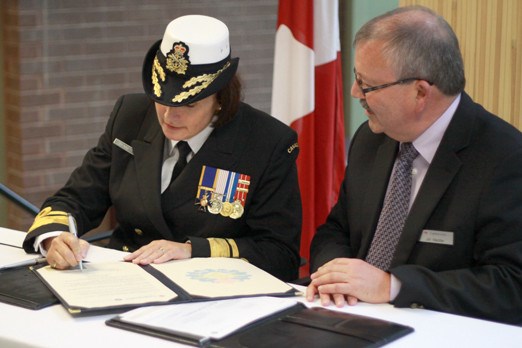Military reservists don’t need to be worrying about whether they’ll have a job when they return from deployment, said Capt. Marshall Erickson.
“They could be going into high-risk situations. Worrying about whether or not you have a job to come back to and whether or not your family is going to be looked after financially, that’s just another stressor you don’t need,” said Erickson, a reservist with the National Defense headquarters and an employee at Confederation College.
Friday college president Jim Madder signed a certificate of support for Canada’s Reserve Force that will allow college students and employees who are also military reservists to leave for deployment or training without worrying about the status of their education or employment.
“When you need to be focusing on the task at hand serving Canadians, whether it’s in Canada or abroad, being able to have this reassurance that your college or your employer or your educational institute is behind you means everything,” he said.
The new policy gives reservists the flexibility to exercise the skills they’ve learned through their training while still maintaining their careers or studies, Erickson said, adding it’s a great contribution on behalf of the college.
Rear-Admiral Jennifer Bennett, chief of reserves and cadets for Canada, signed a certificate of appreciation to the college and said reservists not having to use holidays or miss exams or coursework or deal with scholarship problems shows they have support behind the scenes.
Bennett, the first woman to hold the rank of rear-admiral in Canada, said the Canadian Forces have been working with employers and educational institutes across the country to work on adopting more policies like the one with Confederation College.
“To be able to have time off to pursue training and employment with the Canadian Forces without penalty is one of our goals,” she said.
Up to 30 per cent of military personnel deployed on the most recent operations were reservists, she added, noting Thunder Bay has always contributed greatly to the country’s reserve force.
“Although we are volunteers, it’s important for us to not lose seniority or our standing in our civilian jobs or have to take our holidays to serve our country,” she said. “It will allow students or faculty members to take time off for their military careers.”
Madder said he’s seen the work of the reservists here in Canada with their work managing the flood crisis in Manitoba last year and the evacuations of thousands of people from Northern communities because of forest fires last summer.
“I’m very proud of the reservists we have,” he said, adding they’ve had a lot of interest from students they normally might not attract because of their new policy, students that don’t want to have to focus solely on either their military career or their studies.
“This provides both opportunities for people,” he said.
